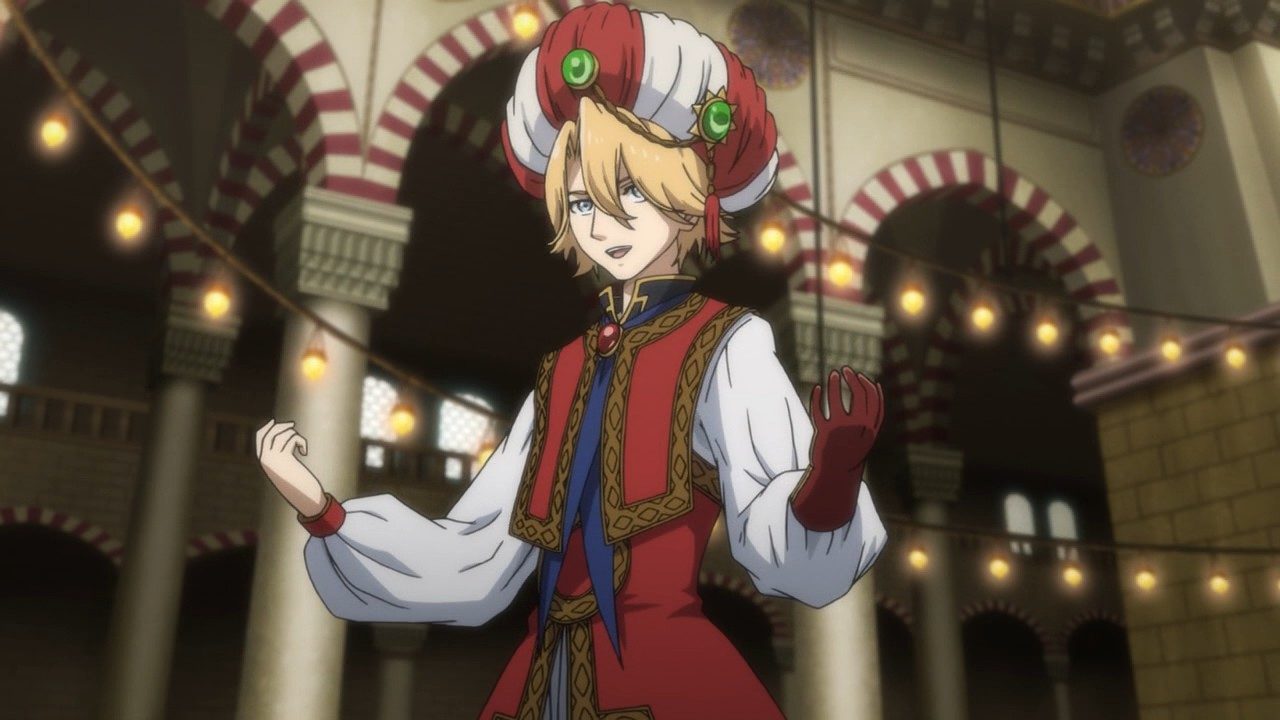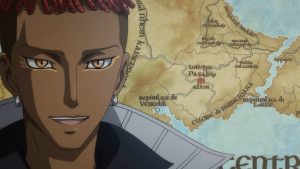 The politics of Shoukoku no Altair is certainly fascinating. Though, all due credit being given, part of that is because the politics of medieval and renaissance Europe is so fascinating (and bloody). What we know as Europe today bears little resemblance to the Europe of that era – there was no Germany or Italy as we know them now, for example, but collections of city-states constantly jockeying for military and economic supremacy. It’s the Italian line that most interests us where Altair is concerned, because that’s where much of the action leading up to the Rumerian War is taking place.
The politics of Shoukoku no Altair is certainly fascinating. Though, all due credit being given, part of that is because the politics of medieval and renaissance Europe is so fascinating (and bloody). What we know as Europe today bears little resemblance to the Europe of that era – there was no Germany or Italy as we know them now, for example, but collections of city-states constantly jockeying for military and economic supremacy. It’s the Italian line that most interests us where Altair is concerned, because that’s where much of the action leading up to the Rumerian War is taking place.
 It’s also interesting that the hero of the piece – who’s a boy truly deserving of that title – has spent his entire brief career trying to forestall the onset of war. Yet as successful as Mahmut has proved in preemptive strategy and rapid response, in that sense he appears to have failed. While Mahmut has immeasurably strengthened his own side’s position in the war to come, he’s been unable to prevent it – which is, I think, an indication that if one side wants war badly enough there’s ultimately nothing to other can do to avoid it. And as this week’s cold open shows, Balt-Rhein clearly wants war (at least, the people that matter do).
It’s also interesting that the hero of the piece – who’s a boy truly deserving of that title – has spent his entire brief career trying to forestall the onset of war. Yet as successful as Mahmut has proved in preemptive strategy and rapid response, in that sense he appears to have failed. While Mahmut has immeasurably strengthened his own side’s position in the war to come, he’s been unable to prevent it – which is, I think, an indication that if one side wants war badly enough there’s ultimately nothing to other can do to avoid it. And as this week’s cold open shows, Balt-Rhein clearly wants war (at least, the people that matter do).
 This dichotomy is very clearly on display with the two parallel narratives that are simultaneously playing out in real-time in this episode. While Mahmut is en route home to finish cementing an alliance which will protect Turkiye on three sides, Louis is taking the final steps to begin proper warfare. Urado (pretty much proved to be Wallachia based on their method of execution) a lost cause for Balt-Rhein, so where his left hand has been thwarted Louis reaches out with his right. He forms an alliance with L’isolani – another of those Italian city-states (it seems to most resemble Genoa) with a formidable navy, and a great rival to Venedik. This is a matter of crisis for the Doge, who sends Brega in a last-ditch attempt to try and salvage something of the situation.
This dichotomy is very clearly on display with the two parallel narratives that are simultaneously playing out in real-time in this episode. While Mahmut is en route home to finish cementing an alliance which will protect Turkiye on three sides, Louis is taking the final steps to begin proper warfare. Urado (pretty much proved to be Wallachia based on their method of execution) a lost cause for Balt-Rhein, so where his left hand has been thwarted Louis reaches out with his right. He forms an alliance with L’isolani – another of those Italian city-states (it seems to most resemble Genoa) with a formidable navy, and a great rival to Venedik. This is a matter of crisis for the Doge, who sends Brega in a last-ditch attempt to try and salvage something of the situation.
 L’isolani wants nothing to do with this – they’ve already signed their deal with the Empire and cast their lot, and they use a faked plague scare to delay and response by Venedik and prepare a blockade of Phoenike, effectively cutting the Centro in half. Unaware of that last part Lucio has gone to meet with the Divan and try and secure an alliance, which King Sigmund takes a rather jaundiced view of – and given Venedik’s history, not without good reason. Mahmut argues in favor, of course, citing the Doge’s personal presence as proof of his seriousness. Vendeik is indeed practical and capricious – because a state in their position had to be. As long as the other party knows that going in, as alliance of mutual benefit can still make sense for both parties.
L’isolani wants nothing to do with this – they’ve already signed their deal with the Empire and cast their lot, and they use a faked plague scare to delay and response by Venedik and prepare a blockade of Phoenike, effectively cutting the Centro in half. Unaware of that last part Lucio has gone to meet with the Divan and try and secure an alliance, which King Sigmund takes a rather jaundiced view of – and given Venedik’s history, not without good reason. Mahmut argues in favor, of course, citing the Doge’s personal presence as proof of his seriousness. Vendeik is indeed practical and capricious – because a state in their position had to be. As long as the other party knows that going in, as alliance of mutual benefit can still make sense for both parties.
 All of this becomes moot when news of the blockade reaches the Divan, and not even Sigmund can find a good reason to argue against the new tripartite alliance, given that all three parties have the incentive of survival to gain from it. To his credit even here Mahmut refuses to acknowledge he’s been thwarted in his quest for peace, and his kind of idealism is indeed needed in situations like this – as Halil Pasha notes. But Halil also asks to take command of the Turkiye expeditionary force (the first in its long history) because now what’s needed in that role is someone who won’t make “youthful mistakes”. That’s a dig at Mahmut and even Zaganos, true, but more a simple statement of fact – and my suspicion is that kindly old Halil will prove to be a very hard man when the situation necessitates it.
All of this becomes moot when news of the blockade reaches the Divan, and not even Sigmund can find a good reason to argue against the new tripartite alliance, given that all three parties have the incentive of survival to gain from it. To his credit even here Mahmut refuses to acknowledge he’s been thwarted in his quest for peace, and his kind of idealism is indeed needed in situations like this – as Halil Pasha notes. But Halil also asks to take command of the Turkiye expeditionary force (the first in its long history) because now what’s needed in that role is someone who won’t make “youthful mistakes”. That’s a dig at Mahmut and even Zaganos, true, but more a simple statement of fact – and my suspicion is that kindly old Halil will prove to be a very hard man when the situation necessitates it.


































